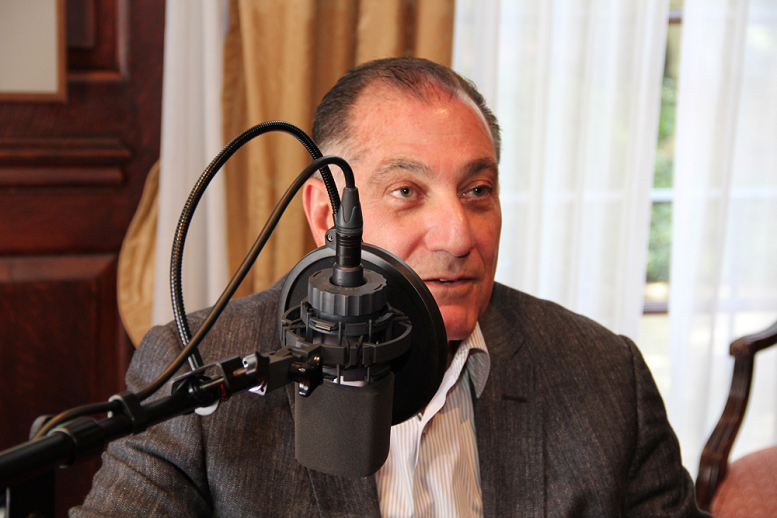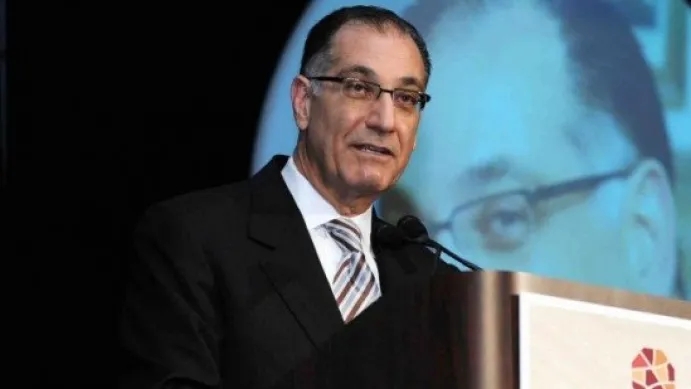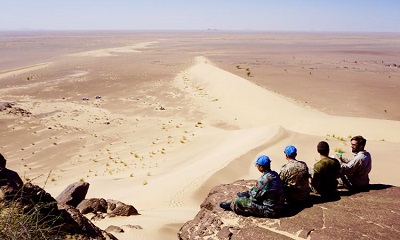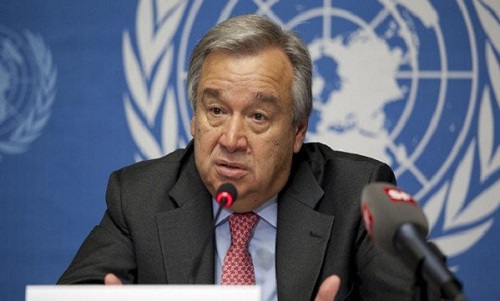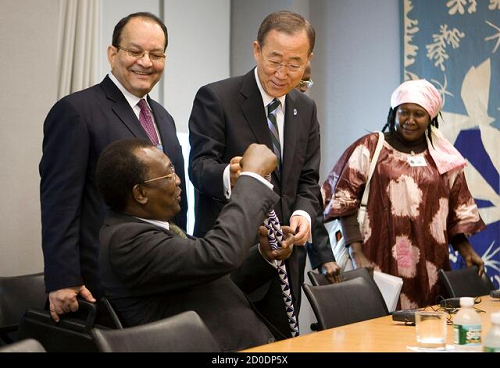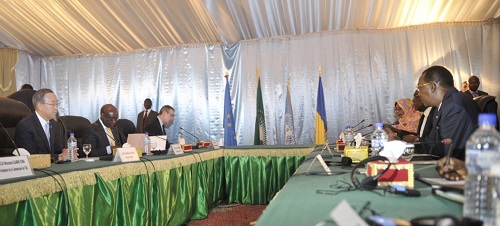Tags : Morocco, USA, Lobbying, Western Sahara, Frente Polisario, Terrorism, Sahel,
Introduction
In the highly politicized atmosphere in Washington during this US presidential election year, US foreign policy receives little attention except when crises occur. In times past, US presidents could count on “flying the flag,” appealing to American patriotism as a means of building support for policies. Today, every word or action is placed under a magnifying glass to determine or infer hidden meanings that reveal the weakness of the proposed policies. Thus, very little moves in Washington regarding policy that is not related to problems and challenges that cannot be delayed.
This challenging milieu makes the efforts of the Washington Team to move the Obama Administration to approve US funding for projects in the Western Sahara even more daunting. Yet the results to date are largely positive. Despite the negative media coverage of the Amina Filali case and Aminatou Haidar’s regular visits to New York and Washington to speak against Morocco’s human rights record, Morocco continues to find a positive reception in Congress. The Washington Team’s drive to have more than 300 meetings with Congressional offices before the summer recess is making great progress. The key message, that US foreign assistance to the camps should be given on condition that it directly improves the lives of the refugees, is being well received. The Team is also working with members and staff to define what these “conditions” should be and concrete projects that the US should fund in the South.
There is a dilemma in the Washington Team’s activities in that Morocco is not in crisis, therefore, some policy makers would prefer to leave the Kingdom’s issues off the agenda while the Administration deals with Syria, Iran, Iraq, and crises beyond the MENA region. Ending the Western Sahara conflict, while a helpful outcome to US interests in the region, is not given a high priority by some in the government. It was therefore helpful that the remarks following the meeting between the Foreign Minister and Secretary Clinton reaffirmed the centrality of the Western Sahara conflict and the commitment to the bilateral strategic dialogue. This visit, and Secretary Clinton’s visit to Morocco, and the generally high praise that Morocco is receiving for its role on the UN Security Council, continue to make the case that Morocco is a leader in the region, and among America’s friends worldwide.
The Communications report below indicates that positive coverage of Morocco far outweighs negative coverage associated with Amina Filali and Aminatou Haidar. Security concerns related to the region, Morocco’s leadership at the UNSC, continued concerns with the direction of the Arab uprisings, and op-eds that show how Morocco is making progress in its reforms and economic development, all contribute to the positive image of Morocco in the media.
This report is not exhaustive nor is it fully detailed as we focus on the items that have the most impact on our strategy. Since it is difficult to distinguish some of the work of the Moroccan American Center from that of the Embassy, this report includes select activities of the Embassy, MAC, and its consultants as the “Washington Team”.
OR:
This report is prepared by the Moroccan American Center, including MACP, MACC and MATIC. It is not exhaustive nor is it fully detailed as we focus on the items that have the most impact on our strategy. While we attempt to only highlight work that MAC has been involved in, in some cases we touch upon the work of others, such as the Embassy or other pro-Moroccan entities. In such related cases, we try to only report on activities where MAC has had a role as well, or where the activity is worthy of highlighting to the Rabat team since it relates to one of the Team’s main objectives. In all cases we try as much as possible to keep this reporting to the principal work of MAC.
Campaigns
MoroccoOnTheMove.com (MOTM)
The Washington Team’s MOTM website and social media program (@MorocOnTheMove) continues to broaden the reach for our messaging, in terms of quantity and targeted audiences. After five months online, nearly 250 postings of news articles and original content by the Washington Team have appeared and the website has received more than 24,000 hits. In that same period, @MorocOnTheMove has sent nearly 900 tweets, has close to 250 followers, and has been retweeted regularly by influential personalities on Twitter. Although we have to improve these numbers even more in the months ahead, this is a strong beginning to our social media efforts.
As part of increasing efforts to engage more regularly with our target audiences, particularly through email and social media, the Washington Team distributed an e-letter, “Reform, stability, and the Western Sahara” to our contacts database of approximately 3,000 policymakers, media, academics, think-tank and NGO leaders, Administration officials, and Congressional staffs. This e-letter highlighted and redistributed materials mentioned in the Communications report including the ICTS report, the Atlantic magazine article, the paper published by the Carnegie Endowment, the Roll Call column, Congressional Record remarks, The Hill op-ed, , the Washington Post “Right Turn” column, the POMED column, and positive press about the launch of RAMED, Morocco’s large-scale healthcare program aimed at providing care to disadvantaged citizens, as well as specific items Rabat wants us to highlight though its mediatization requests.
Also, in March, the Washington Team began distribution of a weekly “Morocco highlight e-mail” to our contacts database, in which one or two events, publications, and/or positive press articles are featured. The purpose of this weekly highlight is to draw attention to an important messaging opportunity to the contacts about Morocco. The first “Morocco highlight e-mail” redistributed the March 27 Global Post op-ed.
Morocco as a Leader
During the month of March, the Washington Team continued its efforts to promote Morocco as a model of progress and reform by regularly briefing and engaging influential policy makers, think-tank leaders, and target journalists.
Activities:
On March 8, The Atlantic magazine, a well-respected publication on culture, current events, and politics for more than 150 years, published an article, “The coming Arab identity crisis,” by Massoud Hayoun which focuses on the questions of Arab identity that have resurfaced during the Arab Spring. The Washington Team arranged an interview for its author with Ambassador Edward Gabriel, who is quoted among other influential leaders in the Arab Diaspora. For further distribution, a blog column highlighting the article was posted on “Who’s who in the Arab world? Examining Arab identity,” on the Foreign Policy Association’s Foreign Policy Blog.
On March 13, Elliott Abrams, Senior Fellow for Middle Eastern Studies at the Council on Foreign Relations, hosted a roundtable at the Council’s offices in Washington with Ambassador Bouhlal entitled, “Morocco and the Arab Spring.” At the event, which was organized through the Washington Team’s outreach to Abrams and CFR, Ambassador Bouhlal detailed Morocco’s reform process and answered questions about the implementation of the new Constitution.
In early March, the POMED Wire, a blog of the Project on Middle East Democracy, posted a report citing dubious torture allegations against Morocco made on the Sahara Press Service (SPS) website. The Washington Team contacted POMED’s executive director, alerted him to the questionable nature of many SPS publications, which prompted him to inform his bloggers to keep the unprofessional nature of SPS in mind before republishing or sourcing its work. Following the conversation, POMED agreed to post a piece on the POMED Wire authored by Ambassador Edward Gabriel, “Gabriel: Change, reform, and progress in Morocco,” which outlined the year of reform in Morocco and how its “Arab Spring” experience was successful and exceptional.
On March 23, the Foreign Policy Association’s Foreign Policy Blog published a column by Moroccan-American international attorney, Leila Hanafi, “Constitutional reforms in Morocco: Outlook for youth rights.” The article examined the success of the current reform process in Morocco and what measures will be necessary to insure that success is sustained and far-reaching. Knowing that Ms. Hanafi’s articles can be somewhat dubious in content, when she asked the Washington Team for feedback we reviewed the draft at her request in order to ameliorate any adverse consequences.
Results:
In March, the Washington Team’s efforts to highlight Morocco’s role as a leader for democratic reforms and peace in the region generated more than 320 positive media placements and 20 million favorable media impressions.
The Polisario and Terrorism in the Sahara/Sahel
During March, the Washington Team continued its efforts to call US attention to the growing threat of AQIM and other terrorist groups in the Sahara/Sahel in order to shape the debate and reinforce perceptions of the Polisario’s negative role in the region. These efforts included journalist outreach, arranging briefings by Washington Team members and third-party spokespeople, and creating fact sheets and other supporting documents for distribution to target audiences.
Activities:
Following the March 2 publication by The Hill of an op-ed by Ambassador Edward Gabriel, « Stop subsidizing recruiting grounds for terrorists and traffickers, » several other media outlets republished or cited the piece, including the World247.net News network and the U.K. Foreign Office/U.K. Government Online. Also, the Italian-based online newspaper, Lettera 43, published an article about terrorism in the Sahel that cited ICTS reports and maps.
To maintain US media attention on the continued detention of the European aid workers kidnapped by members of an AQIM-related group with suspected help from members of the Polisario Front, the Washington Team authored a blog posting on the MOTM website on March 20, “Day 150 – still hostage: Rosella Urru, two others seized by AQIM sect in Polisario camp.” This posting will be a part of a regular series of updates on the kidnapping as the situation develops.
On March 27, the Global Post published an op-ed by Jordan Paul, “Why are we perpetuating a source of instability in North Africa?” The op-ed made the case for retargeting non-humanitarian aid destined for the Polisario to stop perpetuating the refugee camps’ deteriorating security and humanitarian conditions and urged US leadership to resolve the Western Sahara conflict.
In late March, the Washington Team compiled a paper, “Spotlight: The case for redirecting US support for the Polisario-run camps in Algeria, which are becoming a recruiting ground for AQIM, arms and drug traffickers.” The paper provides background information and a chronology of documented incidents and reports linking members of the Polisario Front with AQIM, trafficking, and other illicit activities in the region. It will be widely distributed in April to key contacts in Congress, the media, and think tanks.
Results:
In March, the Washington Team’s efforts to highlight the Polisario’s involvement with rising terrorism in the region generated more than 200 favorable media placements and 21 million media impressions.
Resolving the Western Sahara: Autonomy under Moroccan Sovereignty
Ahead of and following the ninth round of informal talks on the Western Sahara conflict, the Washington Team conducted outreach to journalists, policymakers, and government officials to highlight the urgent need to solve the conflict for security as well as humanitarian reasons and to promote Morocco’s compromise autonomy proposal.
Activities:
To focus US media attention on the informal talks and Morocco’s efforts to offer genuine compromise in the negotiations, the Washington Team issued a press release on March 12, “US, France voice strong support for Morocco’s autonomy plan to resolve Western Sahara dispute, remove obstacle to peace in region.” The release, which highlighted recent public declarations of support for the autonomy plan by US Secretary of State Clinton and French Foreign Minister Juppé, was distributed to PRNewswire and targeted journalists. It was posted by more than 150 US and international media outlets, including Reuters, the Wall Street Journal’s Market Watch, Forbes, Boston Globe, Dallas Morning News, Cleveland Plain Dealer, Sacramento Bee, Yahoo News, AOL News, AfricaBusiness, and Afrik-News. MAP published an article, “Les 9è pourparlers sur le Sahara se tiennent avec en toile de fond un soutien consolidé de Washington au Plan d’autonomie,” that referenced the release and the ICTS report, which was republished by L’Opinion, Le Matin, and several other Moroccan news publications.
Following regular briefings and updates by the Team, two Members of Congress also made strong, public statements of support for Morocco’s autonomy plan as a peaceful, compromise solution to the Western Sahara conflict. In an opinion piece published March 12 in Roll Call, “Changes offer positive sign for Western Sahara”, Rep. Steve Cohen of Tennessee gave the background on why the autonomy proposal was the best option for peace. In remarks for the Congressional Record, Rep. Chris Murphy of Connecticut said the people of the Western Sahara « deserve for this longstanding dispute to be resolved » and stated that Morocco’s compromise proposal is « a reasonable offer and can serve as a basis for negotiations. » Murphy acknowledged, « it is in the interest of the United States and the parties involved to achieve a peaceful, negotiated solution to the Western Sahara issue[.] » MAP ran stories on both Members’ statements, “US Congressman highlights overwhelming bipartisan support for Morocco’s autonomy plan within two chambers of US Congress,” and “Moroccan autonomy proposal, a democratic solution that can serve as a basis for negotiations, US Cong.”
On March 13, the Carnegie Endowment for International Peace published a paper by Professor Anouar Boukhars, “Simmering discontent in the Western Sahara,” in which Boukhars examined a number of internal and external factors that affect resolution of the Western Sahara conflict. The paper – which cited several information sources the Washington Team helped generate – was distributed widely to key contacts and targeted journalists and incorporated into our regular information packet on the Western Sahara.
In order to highlight the urgent need to address the humanitarian crisis in the Polisario-controlled camps in southern Algeria through implementation of durable solutions for refugees, Robert Holley authored a blog posting on the MOTM website, ”You don’t have to live like a refugee”, which is a play on words from Tom Petty song with the same title.
Results:
In March, the Washington Team’s efforts to highlight to US audiences the broad support for Morocco’s autonomy plan and need for US leadership to help resolve the Western Sahara generated more than 650 favorable media placements and 57 million media impressions.
Upcoming in April
On April 3, the Washington Team will host a roundtable, “The Western Sahara crisis: Why US leadership is needed now,” where an expert panel will offer insights on the crisis in the Western Sahara, the growing threat of terrorism in the region, the deteriorating humanitarian situation, and how US leadership can help bring this conflict to a peaceful end. The roundtable will feature Jean AbiNader, Senior Advisor, Moroccan American Center (Moderator), Ambassador Michael Ussery, Former US Ambassador to Morocco, Dr J. Peter Pham, Director, Michael S. Ansari Africa Center, The Atlantic Council, and Robert Holley, Senior Policy Advisor, Moroccan American Center for Policy. To encourage attendance and coverage of the roundtable, the Washington Team widely distributed a press advisory to target journalists, as well as an invitation to all major policymakers and US government officials who focus on Morocco. The advisory was picked up and posted by more than 120 US and international media outlets, including Reuters, the Wall Street Journal’s Market Watch, CNBC, CNN Top News, Boston Globe, African Press Organization, Sacramento Bee, Yahoo News, AOL News, and Afrik-News.
Congressional Activities
The Washington Team conducted over 90 meetings with Congressional offices in March alone, which focused on our core themes: Morocco as a leader, the rising threat of terrorism in the region and the dangers of the Polisario camps, the need to target assistance to the camps, and the need to resolve the issue of the Western Sahara based on autonomy under Moroccan sovereignty.
These meetings serve to maintain our majority support in Congress, to ensure that the truth is known about the Polisario, to build support for targeting assistance to the camps, and to create a greater awareness of the importance of a strong US-Morocco bilateral relationship. These meetings constitute the base we build every year as we never take for granted our current supporters and always seek to secure the support of additional members. The Washington Team followed up on these meetings with a series of emails containing updates, recent news, publications so as reinforce our messaging provided at each meeting. The latter also lay the groundwork for our upcoming meetings so that members are aware of the issues to be discussed well in advance. .
The Ambassador continued his introductory meetings to key Members of Congress. In April, he was hosted for a lunch in the Congressional Members Dining Room where he met with Rep. Steve Cohen (who wrote the Op-Ed earlier in the month), Rep. Ed Towns, Rep. Ed Markey, Rep. Sheila Jackson-Lee, and Rep. David Dreier. The Ambassador also met the co-Chair of the Morocco Caucus, Rep. Michael Grimm. These introductory meetings will continue throughout the year.
The Washington Team also produced significant statements around the latest informal round of the negotiations. Rep. Chris Murphy (D-CT) made a statement in support of Morocco on the eve of the Manhasset talks and Rep. Steve Cohen (D-TN) published a very favorable Op-ed on the Monday of the talks. These statements and Op-Eds from leftist, democratic members help to reinforce the concept that the autonomy/sovereignty solution has broad based support and is the inevitable solution. The more that this message takes hold, the easier it will be to secure congressional support for establishing facts on the ground (building on the language from last year) and conditioning aid to the camps.
The Washington Team also worked with the office of Rep. Mario Diaz-Balart to pose questions to the Administration during oversight hearings with Secretary Clinton on how they planned to implement the language authorizing US assistance to Morocco to be spent in the southern provinces. This helps to keep the issue in front of the State Department and makes them aware that Congress is intent on seeing action this year. The Washington Team is also working with the Appropriations Committee to develop language and secure support for targeting assistance to the refugee camps away from the status quo and towards durable solutions, including a census and resettlement.
MATIC
MATIC worked with the US Chamber of Commerce in setting up its first business delegation to Morocco March 20-22, which including major corporations such as Raytheon, Honeywell, Lockheed Martin, General Dynamics, and others, as well as six companies focused on renewable energies. The Moroccan Embassy arranged for the participation of a number of senior government officials to attend events and lunches and dinners hosted by AMDI and Maroc Export. MATIC hosted a luncheon for the delegation on March 21 and worked with ADEREE, MASEN, and ONE on a panel on renewable energies. Ambassador Kaplan and members of the US Embassy attended the luncheon.
The most important news of the month was an announcement by the China Africa Development Fund (CAD Fund) that it had chosen Morocco for its regional office for North, West, and Central Africa. MATIC has escorted three different CAD Fund delegations in Morocco and helped them survey possible office and apartment sites. MATIC was involved with them in setting up meetings for and providing logistical support, as well as coordinated with GOM officials. MATIC was the first among several Moroccan entities to make contact with the CAD Fund.
MATIC also set up the latest in a series of meetings for MANAS Development Group http://www.manasdevelopment.org/ an international company that provides training services to agencies and companies, which resulted in their choosing Morocco as the location for the regional office serving North, West, and Central Africa.
MACC
Throughout the month of March, MACC staff attended a number of events on the Maghreb and the Middle East, including an Ambassadors forum hosted by the US-Arab Chamber of Commerce, a roundtable on democracy in the Arab World held at the National Press Club, and a conference on access to justice hosted by the American Bar Association.
Ambassador Edward Gabriel
#Morocco #USA #Lobbying #Western_Sahara #Frente_Polisario #Edward_Gabriel

